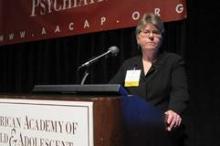NEW YORK – Neither approved nor investigational drugs seem to have much of an effect on the core symptoms of autism.
Medications that help psychiatric conditions in children with otherwise normal development don’t seem to work as well for children who have autism spectrum disorders (ASDs), Dr. Jean A. Frazier said at a psychopharmacology update held by the American Academy of Child and Adolescent Psychiatry.
"The effects seem to be maximized at lower doses than in typically developing youth, and the medications are often much less well tolerated," said Dr. Frazier, a professor of psychiatry at the University of Massachusetts, Worcester.
"If you do try them, the old axiom, ‘Start low, go slow,’ certainly applies."
Because there’s nothing that reliably ameliorates the core symptoms, clinicians and parents focus on treating the behavioral symptoms. Aggression, irritability, and self-injury; hyperactivity and anxiety; and sleep problems not only disrupt family life, but they also can endanger the child. A major cause of death among children with ASDs is "bolting" and falling into a neighbor’s swimming pool, or being hit by a car, Dr. Frazier said.
Risperidone and aripiprazole are approved by the Food and Drug Administration for the treatment of aggression and irritability. But the other commonly used medications, including selective serotonin reuptake inhibitors (SSRIs), atypical antipsychotics, and stimulants are used off label and supported by limited evidence, much of which is based on adult studies.
Risperidone is "pretty effective for reducing tantrums and self-injury," with stable gains over time, Dr. Frazier said. However, it’s associated with "huge weight gain." In its two pivotal trials, children taking risperidone gained an average of 5.6 kg over 6 months – about twice as much as investigators anticipated. This must be balanced with the fact that relapse will occur if treatment stops.
Aripiprazole also was effective in its two pivotal studies, but those were of short duration, she said. Both of the drugs are supported by A-level evidence – the highest grade.
Methylphenidate is used off label and is supported by B-level evidence. In two randomized, placebo-controlled studies, it was superior to placebo, but again, the studies were short and had small numbers enrolled. One of them reported very high levels of "intolerable side effects," including agitation, mood changes, and movement disorders. Divalproex sodium, lamotrigine, and naltrexone have much less supporting evidence.
SSRIs are used off label for repetitive behaviors. All of the evidence behind their use is based on adult studies, Dr. Frazier said. Case series of fluoxetine, quetiapine, and citalopram in children show "promise," but that promise hasn’t been confirmed in large randomized trials. In a recent pediatric citalopram study, many children showed increased energy, hyperactivity, decreased concentration, stereotypic behaviors, gastrointestinal issues, and dry skin.
A Cochrane review published last August found no evidence that SSRIs are of clinical benefit for children with ASDs and, it said "there is emerging evidence of harm" (Cochrane Database Syst. Rev. 2013;8).
The lack of SSRI effectiveness in children with autism spectrum disorders could be related to developmental differences in the serotonin uptake receptors, compared with normally developing children, Dr. Frazier added.
There are also few pediatric studies looking at medical therapy for sleep disorders in ASD. Melatonin is of interest in this arena. "Several recent randomized controlled trials of melatonin have been encouraging. They used up to 6 mg/night. It’s relatively benign, with almost no side effects."
Research continues, Dr. Frazier said. Gamma-aminobutyric acid and glutamate are being pursued as targets. Bumetanide is a loop diuretic used to treat heart failure – it also potentiates the action of gamma-aminobutyric acid. A recent study included 60 children with autism or Asperger’s disorder (Transl. Psychiatry 2012;2:e202). It showed significant improvements in the Childhood Autism Rating Scale and Clinical Global Impression score, but no changes relative to placebo on the Autism Diagnostic Observation Schedule.
Tetrahydrobiopterin is an essential co-factor for several metabolic pathways involved in the production of neurotransmitters. The most recent study randomized 46 children to tetrahydrobiopterin or placebo for 16 weeks (J. Child Adolesc. Psychopharmacol. 2013;23:320-8). There were no improvements on the CGI scales – the primary endpoints – but significant improvements were found in measures of language, social responsiveness, and aberrant and adaptive behavior.
"However, I caution you about taking these studies too much to heart, because they need to be replicated in larger groups," Dr. Frazier said.
Dr. Frazier reported receiving grant funding from GlaxoSmithKline, Hoffmann-La Roche, Neuren Pharmaceuticals, Pfizer, and Seaside Therapeutics.


